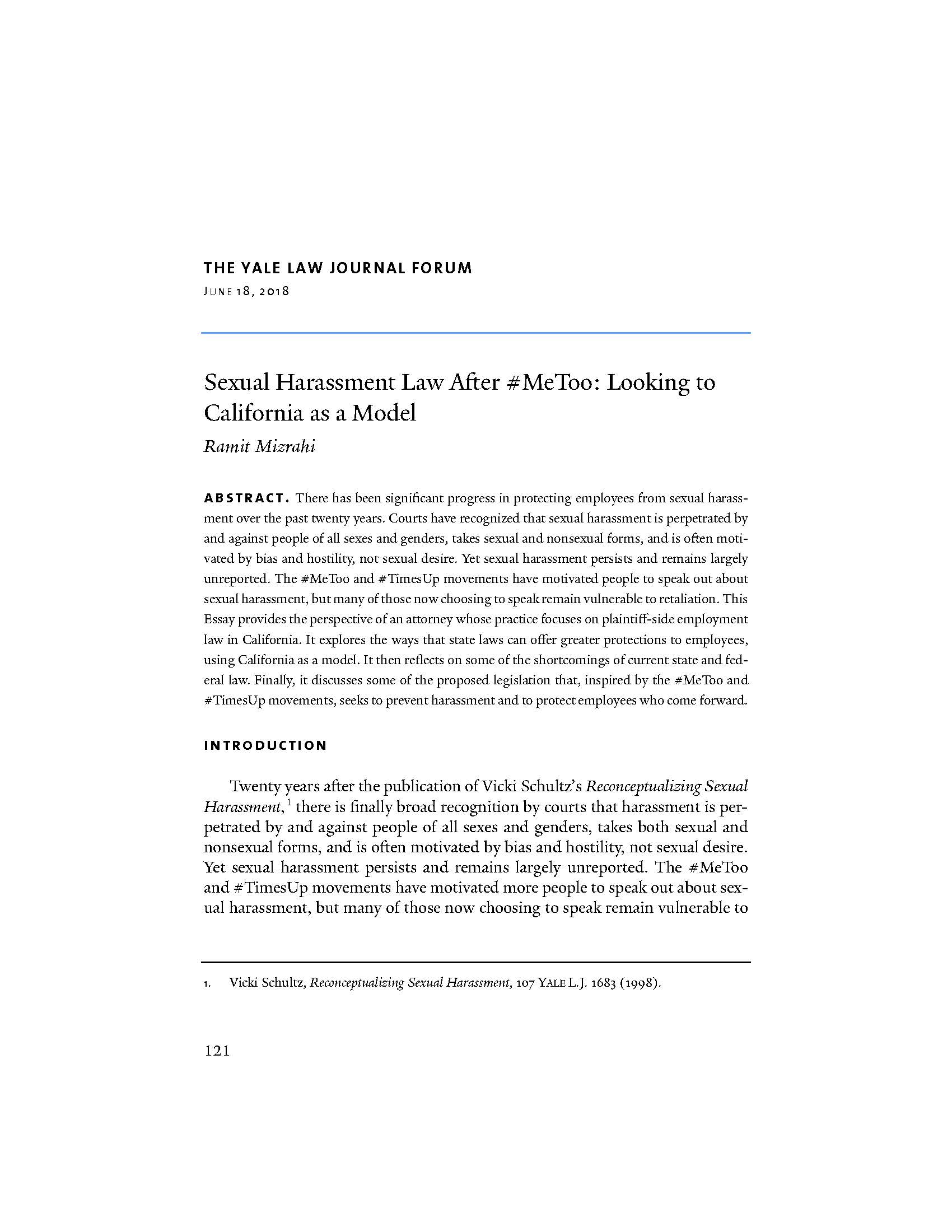-

On May 11, 2022, Ramit Mizrahi appeared on KALW’s Your Legal Rights radio show to discuss workplace harassment–and retaliation–as people return to the workplace, along with with Michael Robbins, Jeffrey Hayden, and Dean E. Johnson. You can listen to the program here.
The following resources may also be helpful:
- A blog post delving into sexual harassment;
- An article by Ramit Mizrahi on sexual harassment litigation in the post-#MeToo era;
- A blog post on H.R.4445, the Ending Forced Arbitration of Sexual Assault and Sexual Harassment Act of 2021;
- A blog post on new California employment laws in 2021; and
- A blog post on new California employment laws in 2020.
-

Introduction — California Protections for Pregnant Workers
California law offers strong protections to employees who have been subjected to discrimination and harassment. Despite that, pregnancy discrimination and retaliation for standing up to discrimination remain rampant. Once employees have been wrongfully terminated, they often know to reach out to seek legal help immediately. But current employees are often more confused about what to do. They may rightfully feel afraid about reporting unlawful conduct to Human Resources, particularly when the conduct is coming from their immediate supervisor. What if it just makes the situation worse? Indeed, far too often, Human Resources is more concerned with protecting the company than with taking the immediate corrective action that the law requires of them. A retaliating supervisor can make a job feel like death by 1,000 paper cuts: scrutinizing, criticizing, and nit-picking every action by an employee, making them feel ostracized or humiliating them in front of their peers, and leaving them in a constant state of fear and anxiety. Indeed, if true, the experiences of the Google employee whose memo went viral demonstrate the myriad ways that a company can fail its employees and allow discrimination and retaliation to persist.
An employee’s best hope is to be fully informed about their legal rights. They can then decide whether to report internally, to file a claim with one of the government agencies that investigates and enforces anti-discrimination laws, to seek private counsel to negotiate an exit or to file suit, or to make a conscious decision to wait (being mindful that if a person waits too long, they may forever lose their ability to assert the claim–a post on this topic will be forthcoming). To that end, I provide the following brief overview of employment protections for California workers subjected to pregnancy discrimination and retaliation. Note that many of these topics have been covered in greater depth elsewhere throughout the blog. (The archive categories are listed to the right of this post.)
1. Discrimination
The Fair Employment and Housing Act (“FEHA”) prohibits discrimination against employees because they belong to a protected category (sex, pregnancy, race, religion, disability, etc.). This includes refusing to hire or promote employees, terminating them, or discriminating against them in compensation or in terms, conditions, or privileges of employment.
2. Harassment
The FEHA further prohibits harassment against employees, applicants, unpaid interns or volunteers, and contractors because of their protected status. Employers are strictly liable for harassment by a supervisor. They are liable for harassment by non-supervisors, and even non-employees, if they knew or should have known of the conduct but failed to take immediate and appropriate corrective action. Employers are obligated to take all reasonable steps to prevent harassment from occurring. An employee need not lose tangible job benefits (e.g., be terminated or demoted) to establish harassment. More on workplace harassment can be found here.
3. Retaliation
The FEHA protects an employee who has “opposed any practices forbidden” under the Act.
An employee is engaging in protected activity when she opposes any practice that would violate the FEHA, even if the practice is not directed at her: “The ‘opposition’ clause protects conduct by an employee who is not the direct victim of a practice made unlawful under Title VII, but who ‘opposes’ such discrimination against others.” (Chin, et al., Cal. Practice Guide Employment Litigation (2019 The Rutter Group) ¶ 5:1527.) Thus, it is unlawful for an employer to retaliate against an employee who reports or otherwise opposes pregnancy discrimination. The FEHA separately imposes liability on an employer for failing to prevent retaliation.
An employee does not have to be right that discrimination actually occurred; they are protected if they had a good-faith belief of discrimination.
Employees also have protections under California’s general whistleblower protection statute, Labor Code § 1102.5, which protects employees from retaliation when they (1) disclose information that they reasonably believe to violate state, federal, or local laws or regulations, or (2) refused to participate in any activity that would violate state, federal, or local laws or regulations.This protection applies whether the employee complains (a) externally to a government or law enforcement agency or to a public body conducting an investigation, inquiry or hearing, or (b) internally to “a person with authority over the employee or another employee who has the authority to investigate, discover, or correct the violation or noncompliance” (e.g., their manager or HR).
Employees are protected even if the disclosures were part of their job duties (so for example, a safety officer is still protected when speaking out about unsafe conditions). Family members of a person who has, or was perceived to have, engaged in protected activities are also protected from retaliation.
Despite these protections, research has shown that when discrimination or harassment is reported, the consequences can be dire: an estimated 75% of employees who speak out against workplace mistreatment faced some form of retaliation.
-
On June 18, 2018, Ramit Mizrahi’s essay, Sexual Harassment Law After #MeToo: Looking to California as a Model, was published in the Yale Law Journal Forum. The essay is part of a Collection by the Yale Law Journal and the Stanford Law Journal on #MeToo and the Future of Sexual Harassment Law. Ms. Mizrahi’s essay is the only one in the Collection that gives the perspective of a practicing lawyer and is not written by a legal scholar.
Drawing from her extensive experience representing employees in sexual harassment cases, Ms. Mizrahi discusses the evolution of the law, including the impact of the #MeToo and #TimesUp movements, current shortcomings, and proposed legislation in California that would help prevent harassment and protect employees who come forward. This is Ms. Mizrahi’s second piece on sexual harassment law that the Yale Law Journal has published. The first was “Hostility to the Presence of Women”: Why Women Undermine Each Other in the Workplace and the Consequences for Title VII, Note, 113 Yale L.J. 1579 (2004).
The essay
Sexual Harassment Law After #MeToo: Looking to California as a Model can be found here. You can also click on the below image for the link to the pdf version: -

2014 will be the year of the whistleblower in California.
Here’s why: On January 1, 2014, new laws (AB 263, SB 496, and SB 666) went into effect that fixed major gaps in Labor Code § 1102.5, the California whistleblower protection law. These are gaps that you probably didn’t even know existed . . . .
Retaliation
Mizrahi Law, APC
- 35 N Lake Ave, Ste 710, Pasadena, California 91101
- dates@mizrahilaw.com
- (626) 380-9000
Client Testimonial
“I highly recommend Ramit Mizrahi. She has a winning combination of knowledge, passion, strategy, and empathy. She takes action and communicates updates promptly. Her professionalism is hard to beat. I’d give her 10 stars if I could!”
Latest News
- Ramit Mizrahi has been recognized as one of the Top 100 Super Lawyers and Top 50 Women Super Lawyers in Southern California in 2023.
- Ms. Mizrahi is being recognized in the 2023 Edition of The Best Lawyers in America©, published by U.S. News & World Report and by Best Lawyers.
- Ms. Mizrahi has been selected as a Top Attorney by Pasadena Magazine for 2023.
- Ms. Mizrahi is serving as Chair of the Pasadena Bar Association Labor and Employment Section.

